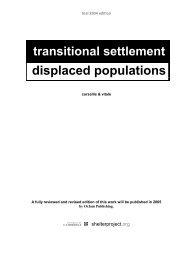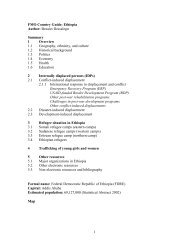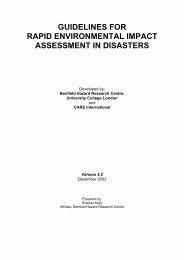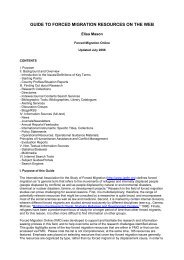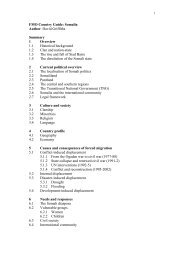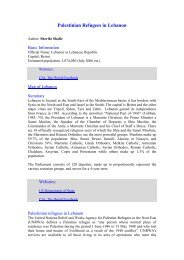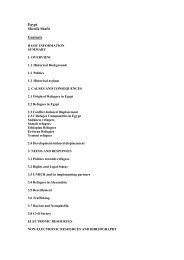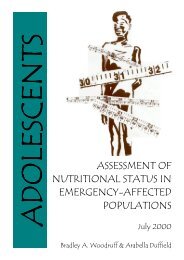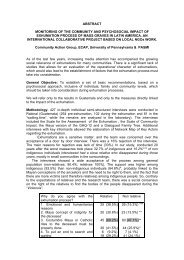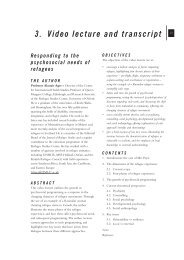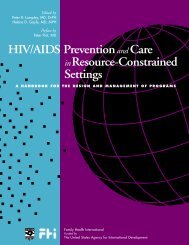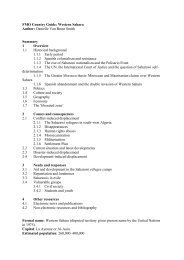Afghanistan. - Forced Migration Online
Afghanistan. - Forced Migration Online
Afghanistan. - Forced Migration Online
Create successful ePaper yourself
Turn your PDF publications into a flip-book with our unique Google optimized e-Paper software.
International Covenant on Civil and Political Rights<br />
International Covenant on Economic, Social and Cultural Rights<br />
Convention on the Prevention and Punishment of the Crime of Genocide<br />
Convention on the Political Rights of Women<br />
International Convention of the Elimination of All Forms of Racial; Discrimination<br />
Convention Against Torture and Other Cruel, Inhuman or Degrading Treatment or<br />
Punishment<br />
On the Involvement of Children in Armed Conflict<br />
<strong>Afghanistan</strong> is not a signatory to the 1951 Refugee Convention and its 1967 Protocol<br />
Websites<br />
World LII<br />
Foreign Commonwealth Office, UK<br />
2.2.6 Reconstruction and Development<br />
Twenty three years of war has left <strong>Afghanistan</strong> one of the poorest countries in the world, with<br />
an economy based largely on the trade of drugs and guns, and an almost complete breakdown<br />
in systems. The reconstruction effort requires not only the rebuilding of the country’s<br />
infrastructure but also the rebuilding of its institutions, including the military, police and the<br />
judiciary. Years of conflict and shifting front lines have left the country riddled with land<br />
mines and unexploded ordnance (UXO) that must be removed before arable land can be<br />
returned to productive use. The task is enormous and requires a sustained effort on behalf of<br />
the international community.<br />
At the end of January 2002, a donors’ conference was held in Tokyo resulting in pledges of<br />
more than USD 4.5 billion. Such pledges were made by the following countries: United States<br />
(USD 297 million for 2007); Japan (up to USD 500 million over 3 years); the United<br />
Kingdom (USD 288 million over 5 years); the European Commission (USD 500 million for<br />
the current year); Germany (USD 362 million over 4 years); the World Bank and Asian<br />
Development Bank (USD 500 million each over the next 2.5 years); and Saudi Arabia (USD<br />
220 million over 3 years).<br />
In March 2004, Berlin hosted the <strong>Afghanistan</strong> Conference which produced the Berlin<br />
Declaration – outlining the way ahead. In December 2005 the Conference on Regional<br />
Economic Cooperation was also held in Kabul which focused participants on issues of trade,<br />
investment and regional cooperation.<br />
In January 2006, at the London Conference on <strong>Afghanistan</strong>, the international community<br />
pledged approximately 10.5 billion USD towards reconstruction and development initiatives<br />
over the following five years. In early 2007, USD 11.6 billion were committed from the US<br />
focus on building the legal economy and alternative livelihoods, health care, education,<br />
sanitation, building administrative capacity, roads, energy and telecoms.<br />
The Bonn Accord places emphasis on the role of the Afghan government and its institutions<br />
to take the lead in the country’s reconstruction and development. Progress towards the reestablishment<br />
of state institutions however has been patchy and slow. Since 2001, the focus of<br />
aid and assistance has been on Kabul ministries, while less assistance has been directed at the<br />
strengthening of local government structures in the provinces. The need to redress this<br />
imbalance has become clear during 2006 and 2007, as security has declined in some of the<br />
regions and where the development has hampered due to lack of systems and functioning<br />
12



